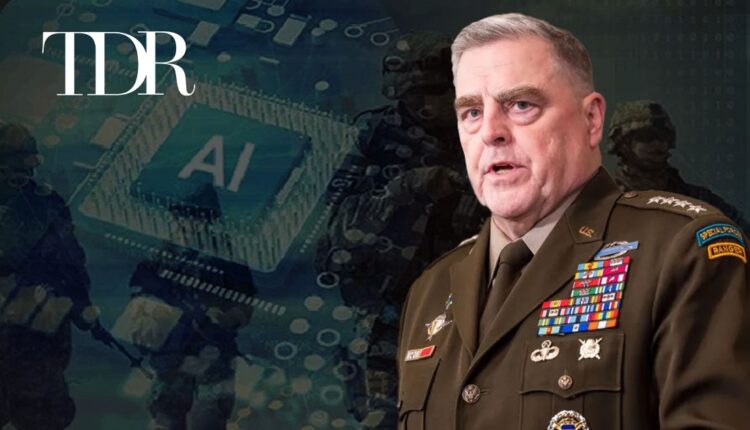
U.S. Military AI: General Milley’s Vision for the Next 15 Years:
The TDR Three Key Takeaways regarding U.S. Military AI:
- General Milley predicts up to 33% of the U.S. military could be robotic within 15 years.
- The Ukraine conflict shows the strategic use of AI-driven UAVs in modern warfare.
- Milley emphasizes the need for ethical frameworks in AI military use.
Retired Army General Mark Milley made a groundbreaking prediction: within the next 10 to 15 years, 25-33% of the U.S. military could be composed of robotic systems managed by artificial intelligence (AI). At an Axios event, Milley emphasized the profound implications of this transference, comparing it to past technological advancements such as the transition from muskets to rifles.
Milley’s vision underscores the importance of AI in the U.S. military and its potential to revolutionize defense strategies. The integration of artificial intelligence in military operations is expected to enable faster and more accurate decision-making processes. This technological leap could be as transformative for the character of warfare as previous innovations were in their times. As Milley noted, “Ten to fifteen years from now, my guess is a third, maybe 25% to a third of the U.S. military will be robotic.”
One notable area where AI is already making significant strides is in the deployment of unmanned aerial vehicles (UAVs). These military robots have become critical in surveillance and combat operations. The recent conflict in Ukraine highlighted this development, with Ukraine developing a domestic drone industry to support its military efforts. This real-world application showcases the increasing reliance on AI-driven technology in modern warfare.
Despite the strategic advantages AI offers, there are substantial ethical and policy considerations. Current U.S. policy mandates human oversight of military robots, especially concerning the use of lethal force. This requirement is rooted in the ethical framework that human judgment provides. However, Milley speculates about a future where AI-enabled robots could make autonomous decisions, raising significant ethical and societal questions. The ethical implications of AI in the military are complex, as they challenge existing norms and necessitate a reevaluation of the frameworks governing the use of force.
General Milley, who served as the chairman of the Joint Chiefs of Staff from 2019 to 2023, has been a vocal advocate for the integration of AI and robotics in the military. His tenure and perspective provide valuable insights into the future of warfare technology. Milley’s views highlight the necessity for the U.S. military to embrace technological advancements to maintain a strategic edge.
The U.S. military faces significant challenges in managing the ethical implications and rapid pace of AI in defense. Balancing technological innovation with ethical considerations will be crucial as AI and robotics play a central role in its evolution. Want to be updated on Cannabis, AI, Small Cap, and Crypto? Subscribe to our Daily Baked in Newsletter!



